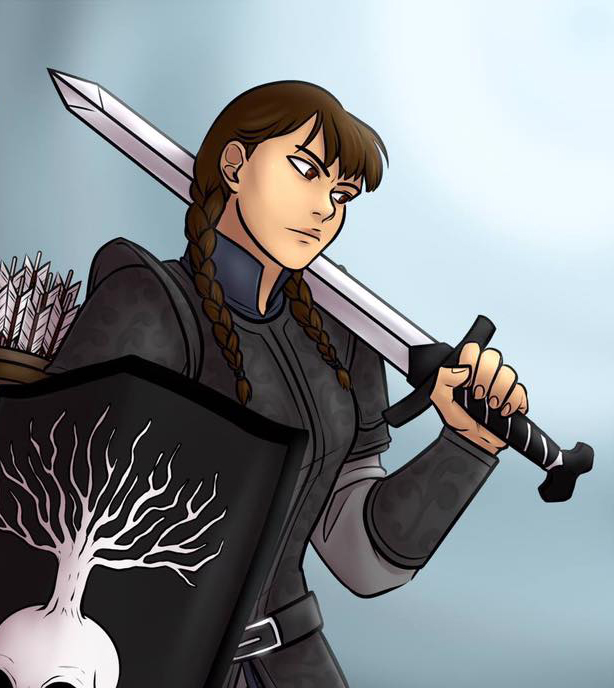The Gospel of Istra, in The Drottkvaet or Old Court Skaldic meter
(12 beats per line, in 6 beat segments. aBaB rhyme, with ‘a’ as trochee soft rhyme, and ‘B’ as a hard rhyme. Extensive alliteration to aid memory.)
Blood calls to us, blood-born, and by battle blooded,
The rent skin’s red river. A vibrant vivid sight.
All gaze upon its gush. Guard its loss, lest gutted,
The red that once raptured, turns horror, not delight.
A death, and what’s destroyed? All the dead one’s lessons.
A life. A lineage. Potential’s end. Such power!
So exhilarating. To feel ending’s essence.
Blood spilled. I thrilled to kill. To take a man’s last hour.
Once, I waded, wallowed, in blood and excrement.
In screams, in gags and gasps. When there were screams, I came.
I, Istra, sword maiden, whose blade made men lament.
I, ice-veined. Right. Righteous. A reaper without blame.
Then Shepherd of the Dead, archangel Lurian,
Who slips in dreams, and speaks, gave urgent whispered choice:
Be destruction. Death. Or: Repent my fury’s sin,
Heal. I heard, and haunted, ignored that solid voice.
I chose ruin. Mine and man’s. Destruction’s blade, bloody.
An undefeated blade. A cloak of flesh – man’s own.
Havok’s horror. Harm-mad. I made it rain ruddy.
I made a throne of blood. I made a throne of bone.
Believing I was right. But then came Benalus.
Requesting peace, passage, through my black blood-soaked fields.
He and his large army. I laughed, not covetous…
Of peace. My land grew bones. Why should I, Istra, yield?
I sang the song of steel. Men – wheat – to my scything.
I was War with no end. I had no cause to bend.
So battle broke, brutal. Our wounds wept, red tithing.
Archangel-deaf, Istra, seeking what I could rend.
Then Lurian appeared, awake-seen, arisen.
Up from the dead all piled. I saw. I caught my breath.
A thousand crows with him. His great wings. A vision.
And more than a vision. The herald of all death.
My death, and all men’s death. His eyes were white, blazing,
White-hooded and watching. I knew then who I faced.
He spoke, and now I heard. My cruel deeds, my razing,
My wrath and destruction, all a disgusting waste.
In His eyes, I saw death. I knew I’d chose wrongly.
In the billowing folds of Lurian’s white cloak
I saw the souls I’d shorn, and felt fiercely, strongly,
I was His, always His. A fool to flee his yoke.
I plunged my bloodied blade, hilt-deep, in earth buried.
My armor discarded, rain rinsed shoulder and breast,
The wet metal ran clean. But sin’s stain, once carried,
Is harder to set down. I knew I could not rest.
The rain would not rinse me – my soul by blood blackened.
Unarmed and unarmored, I walked away from sin.
As once, in bloody work, my pace never slackened,
Now I’d try to undo, one hundred fold, again.
Bearing solace, succor, things in this world lacking,
Consoling, comforting, a caretaker of man,
Pain easer. Wound healer. Never more attacking.
A servant of mankind, and of my Lurian.
My soul found peace and rest, in a world conflicted.
But not yet purity. Those, purified, are freed
In death to their reward. I remained convicted,
By my brutal actions, every last violent deed.
And those I healed had time, destiny delayed yet,
To change their course towards God. And those whose time was nigh
Had their release – a gift. So I paid my great debt:
To them kind face and words, farewell at their last sigh.
The Archangel of Death had made me his door man:
The door of death. Its host. The usher of that space,
With gracious welcoming, be they king or poor man.
Lurian’s honored guests who at last see His face.
But most can yet live on, with the lores of healing,
With rites and ornaments, bandage, and scholar’s art.
Balance of the humors – phlegm, choler, congealing,
Third, black bile, and fourth, blood. For me, an end and start.
The flesh can heal, and mind. Some thoughts can be diseased,
And need be purified. Some harms are healed with sleep,
With rest, or scourge of dream, for Lurian, displeased,
Sends night-sign and torment, a tax that some find steep.
I battled spirits then. Maleficent beings.
They enter into wounds, and must be purged with care,
With fire and heat. It hurts. But sends spirits fleeing.
Lurian hears the screams, as sweet as any prayer.
And so, a decade passed, and always I refrained.
Though violence called, I prayed. I never joined the fray.
I listened for crying, and went to serve the pained.
I’d have done forever, but came the fated day.
They came for Benalus. The darkest of onslaughts.
The Feasting King. Fleshless. Hooded. The Miser Lord.
Such overwhelming odds. The best of us soon caught.
Lurian reached for him. Death! I wished for a sword.
I begged the archangel. Unarmed, and then … gifted.
A sword of sharp silver. My flesh, his body’s shield.
I became Death. Their Doom. A blade, again lifted.
Unstoppable as Night. And thus, I reaped the field.
And Benalus survived. Like my last words, spoken,
When silver stopped singing, and I lay in the mud.
An acolyte found me, who sought out the broken,
My usher through death’s door, the one framed in red blood.

